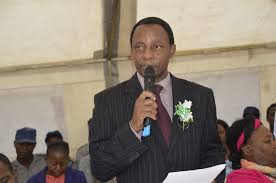By Patricia Mashiri
David Parirenyatwa, the minister of health and child care has called on stakeholders to afford people quality health services, where and when they need them, without suffering financial hardships.
Dr Gibson Mhlanga , the Principal Director Preventive Services Ministry of Health and Child Care who was standing in for Parirenyatwa said universal coverage means individuals and communities receive the health services they need without suffering.
“Universal health coverage means individuals and communities should receive the health services they need without suffering financial hardships. It includes the full spectrum of essential quality health services from health promotion, treatment, rehabilitation palliative care.
“Protecting people from the financial consequences of paying for health services out of their own pocket reduces the risk of pushing people into poverty, thereby improving the quality of life of the populace,” Parirenyatwa said.
He alluded to the Zimbabwe National Health Strategy that aims for a universal health system that provides quality health system for all particularly through public health services for all.
It embraces the need to provide all people with access to needed health services including prevention, promotion, treatment and rehabilitation.
Dr Prebo Barango, who was representing Dr Matshindiso Moeti, the WHO Regional Director for Africa, said the African region has been improving through several strategies such as distributing insecticides and treated nets to prevent malaria and vaccinating against the human papilloma virus.
“Access to treatment and essential services has improved. For the first time, more than half of all people living with HIV in Africa (14 million) have access of life-saving HIV treatment. Between 2010 and 2016, new cases of malaria dropped by 20% and were 37% fewer deaths due to malaria.
“However, much more needs to be done to curb the increase in non-communicable diseases, address new threats such as SARS, H5N1, and tackle epidemics like Ebola and cholera. There is also a need to address the challenge of antimicrobial resistance and substandard and falsified medicines,” Moeti said.
In 1948, the WHO held the First World Health Assembly and decided to celebrate 7 April of each year, with effect from 1950, as the World Health Day.
On the same event there was the launch of Health Ageing strategy which is the development and maintenance of optimal mental, social and physical well-being and function in older adults. Health Ageing emphasises the need for action across multiple sectors and enabling older people to remain a resource to their families, communities and economies.
Speaking about the strategy, Dr Mhlanga said the strategy spells out everything that the government needs to do for the elderly people in the community. He said the strategy should should help the elderly (65 year-old and above) to get free treatment at public health institutions.






